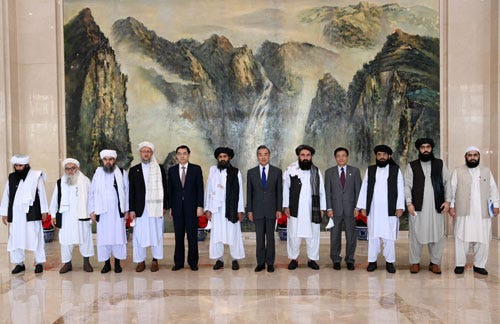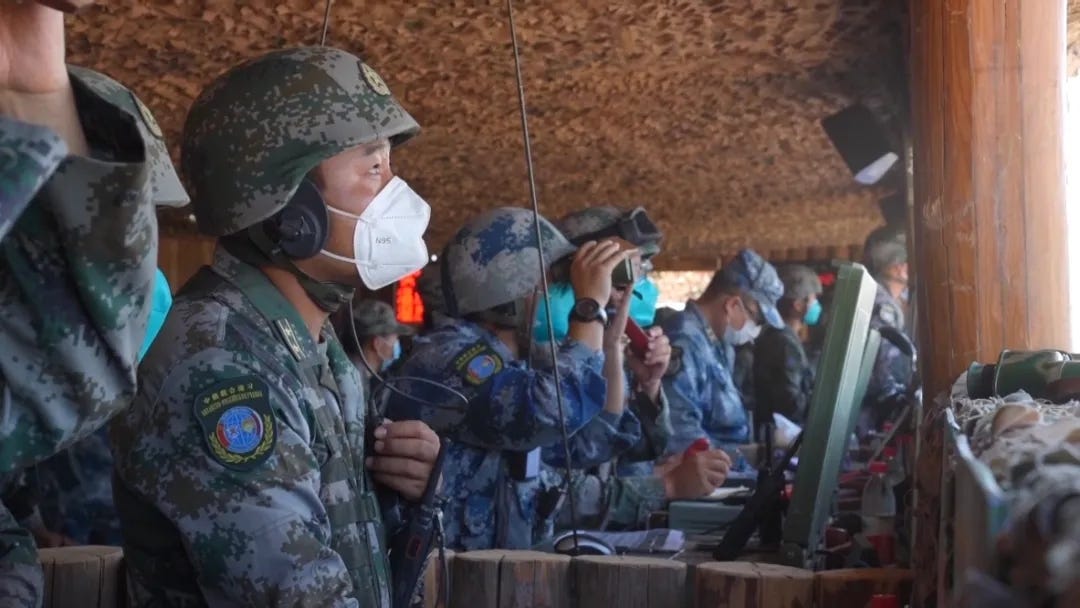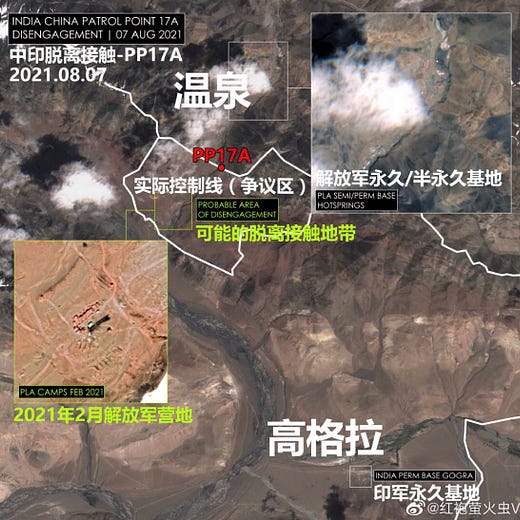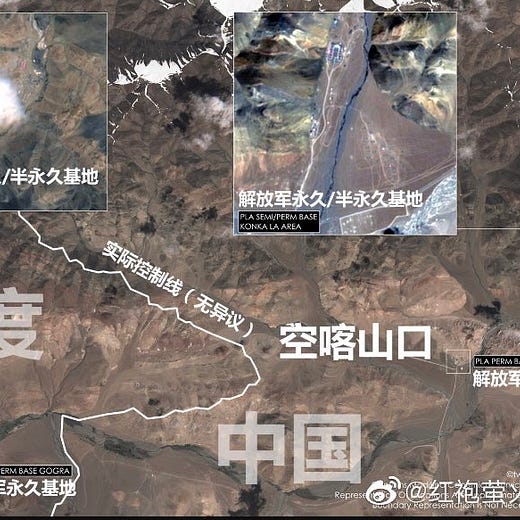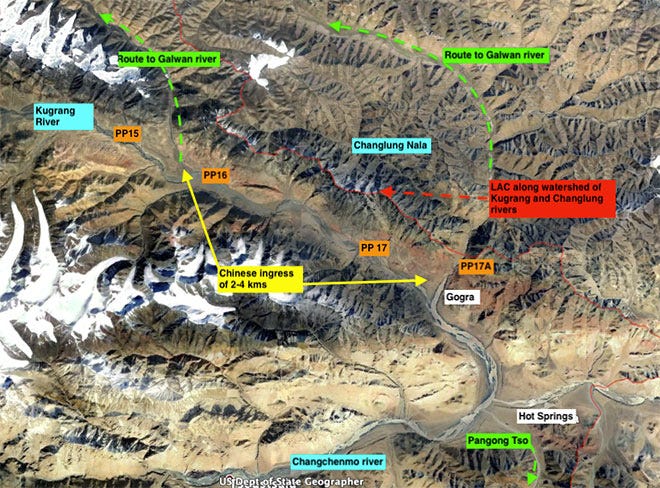Asia Communique
China’s embrace of Taliban — China's tech crackdown to continue — Power grab at WHO
China’s embrace of Taliban: A work in progress
There has been much speculation about China’s role in Taliban-led Afghanistan since the images of a meeting in Tianjin between a Taliban delegation and Wang Yi surfaced on July 28. China and the Taliban held their last meeting in 2019. Some have argued that China has confidently hedged its bets in favour of the Taliban and wanted a withdrawal of US forces at all cost. But we know that’s far from true.
“Wang Yi pointed out that the Afghan Taliban is an important military and political force in Afghanistan and is expected to play an important role in the country's peace, reconciliation and reconstruction process. We hope that the Afghan Taliban will put the interests of the country and nation first, hold high the banner of peace talks, set the goal of peace, build a positive image and pursue an inclusive policy. All factions and ethnic groups in Afghanistan should unite as one, truly implement the "Afghan-led and Afghan-owned" principle, push for early substantive results in the peace and reconciliation process, and independently establish a broad and inclusive political structure that suits Afghanistan's national realities” said Chinese foreign ministry after the meeting with Taliban.
China wasn’t fully prepared for a Taliban-led government in Afghanistan. We know this from the new rhetoric that has started emerging out of Beijing.
Wang Yiwei, Director of Center for European Studies at the Renmin University of China, called Taliban the “Liberation Army”. He said Afghanistan is “demonized” by the US. He spoke about the friendship between the Taliban and China in a video.
Following the Taliban’s take over of all Afghan provinces, some Chinese commentators took to defending China’s rapprochement with the Taliban.
Hu Xijin wrote three posts on Weibo related to the situation in Afghanistan. One of the posts carried a picture from a meeting between former US Secretary of State and Taliban leader Mullah Baradar.
Later, the picture was shared on Chinese social media and Twitter by state media journalists and pro-China Twitter account. Hu Xijin’s post set the agenda for what message would be sent out to the world about China’s engagement with the Taliban.
“Look at this picture for fools who accuse China of not having “moral” links with the Taliban. Last September, US Secretary of State Pompeo met with Taliban No. 2 Mullah Baradal in Doha. The same senior Taliban official came to Tianjin, China, not long ago, and Wang Yi met with him. I don’t know if those stupid people accused Pompeo in September last year?” said Hu Xijin in the post with the picture of Pompeo.
Reuters has confirmed the preparation underway by Chinese state media.
“Since then, China's propaganda machinery has quietly begun preparing its people to accept an increasingly likely scenario that Beijing might have to recognize the Taliban, the hard-line Islamist movement that is rapidly gaining territory in Afghanistan, as a legitimate regime”, reported Reuters.
In his long post, Hu Xijin expressed his thoughts about Afghanistan and where China stands.
Translation of Hu Xijin’s post:
“The US media and some Western media have recently said that the situation in Afghanistan is “embarrassing” for China. I have wondered. The United States is escaping from Afghanistan in a hurry, and they faced a serious situation when they retreated from Saigon. They fear that the US embassy will be ransacked by the Taliban. How can this be embarrassing for China?
The influence of the Taliban on the situation in China's Xinjiang is greatly exaggerated. There is only a very narrow Wakhan Corridor between China and Afghanistan, where the People's Liberation Army is stationed, and it is difficult for a bird to fly over. The “three forces” do not want to cross that passage. If the Taliban support terrorism after seizing power, the United States and the West will be the first threats. The United States wants to prevent a new “9/11”, and China will not have any problem. The Taliban still want Chinese investment, so why do they want to engage with China? In the future, a large-scale “East Turkistan” training base will appear in Afghanistan, and then those terrorists will enter Xinjiang to make trouble is the imagination of some people and the dream of some Westerners. China has sufficient capabilities and means to ensure that such a situation does not occur. China will not go to Afghanistan to fill a “vacuum”. China is a peace-promoting force in Afghanistan and a friend of the entire country. China has no intention to change anyone. Our foreign policy is to respect the choices of the people of all countries, live friendly with other countries, provide them with assistance within our capacity for peace and development when countries need us, and form mutually beneficial and cooperative relations with them. So let the United States be anxious and uncomfortable, and let the Biden administration pay their political price for the double failure of the epidemic and the second front in Afghanistan. The United States is an unreliable country. It may abandon its allies at a critical moment. The situation in Afghanistan has given people this impression. Okay, let this impression spread”
“China is prepared to recognize the Taliban as the legitimate ruler of Afghanistan if it succeeds in toppling the Western-backed government in Kabul, U.S. News has learned, a prospect that undercuts the Biden administration's remaining source of leverage over the insurgent network as it continues its startling campaign to regain control” reported US News.
Hu Xijin isn’t the only one trying to build the bases for cooperation between the Taliban and China. Though both have had meetings in the past, those engagements were nothing like what we are about to witness.
"This shows that China might have dangled promises of economic aid and investment to a post-war Afghanistan as a carrot to encourage both sides to stop fighting and reach a political settlement," said Zhang Li, a professor of South Asian studies at Sichuan University, according to Reuters.
“This is us being pragmatic. How you want to rule your country is largely your own business, just don't let that affect China," Lin Minwang added, according to Reuters.
“The ‘fall of Kabul’ marks another turning point in the decline of American hegemony. As we all know, after the end of the cold war, as the only superpower, the United States was in the limelight for a time, and the "theory of the end of history" was rampant. After tasting the sweetness of bombing the Federal Republic of Yugoslavia at the end of the 20th century, the United States launched the war in Afghanistan and the war in Iraq at the beginning of the 21st century, showing its hegemonic style of ‘giving up who I am’. As everyone knows, the reincarnation of heaven, militarism and hegemony cannot last,” said Xinhua in a report. Though Xinhua, People’s Daily and other Chinese state media outlets did report the Taliban’s take over, the stories weren’t prominently published on the Chinese version of their website.
On Sunday, "Taliban is about to take power in Afghanistan" was the number one trend on Baidu. “Trump criticizes Biden on the Afghanistan situation” was another prominent trend on Weibo.
“The Chinese Embassy in Afghanistan said on Sunday it had asked different Afghan parties to ensure the safety of Chinese citizens, institutions and interests in the country. In a statement, the embassy said there have been no reports of casualties of Chinese citizens in the country and urged its nationals to follow the security situation closely,” reported CGTN.
The Paper carried remarks by a Chinese national in Afghanistan who said, “No one guessed that the Taliban would come so fast”. “Our staff still said yesterday, I believe that the government forces will be able to hold Kabul, and then today (August 15) everyone is discussing how to leave Kabul,” said Xiao Ran in an interview from Kabul.
In another news, the recent attack on the Dasu dam was in the news again. Pakistan has concluded, and China silently supports the conclusion.
“The explosion on a bus in northern Pakistan that killed nine Chinese nationals and three Pakistanis last month was a suicide bombing carried out by the Taliban movement in Pakistan, the Pakistani Foreign Ministry said Thursday,” reported Caixin.
“The Pakistani side’s investigation into the terrorist attack has seen major progress within a short period of time. China pays great attention to this and expresses appreciation for Pakistan’s active efforts. Further investigation by Pakistan is still ongoing at the moment,” said Hua Chunying of the Chinese foreign ministry. Pakistan directly named India and Afghanistan as the masterminds of the attack. Though Hua Chunying didn’t mention India or Afghanistan in her statement, China MFA issued a separate statement that started with a question by state media journalist which mentioned the two South Asian countries.
“Some suspects have been arrested in Pakistan, and the rest are now in Afghanistan. Within the territory, the terrorist network to which the attacker belongs is supported by the intelligence agencies of India and Afghanistan,” said a commentator.
China's tech crackdown to continue
China has unveiled a five-year plan on governance outlining a tighter control of the economy. The five-year plan is a continuation of a previous five-year plan on governance and law. But the focus on the party’s control on the economy and technology makes the plan worth reading.
The plan is called “Implementation Outline for the Construction of a Government under the Rule of Law”.
"Strengthen and improve anti-monopoly and anti-unfair competition law enforcement," says the five-year plan. This suggests the current wave of regulatory action against Chinese tech companies could continue till 2025. That’s because the five-year plan will continue until 2025.
“The document, jointly issued late Wednesday by the State Council and the Communist Party’s Central Committee, said authorities would “actively” work on legislation in areas including national security, technology and monopolies. Law enforcement will be strengthened in sectors ranging from food and drugs to big data and artificial intelligence, the document said,” reported Bloomberg.
Some experts believe that news organizations exaggerated the implications of the five-year plan. But I believe the overall control of the party on the private sector and other aspects of Chinese society will continue to tighten.
“China has embarked on a new journey of building a modern socialist country in an all-around way and marching towards the second centenary goal, coordinating the overall strategic situation of the great rejuvenation of the Chinese nation,” said a section in the five-year plan.
The latest five-year plan on governance was the top trend on Weibo.
New Chinese ambassador met the US Deputy Secretary of State Wendy Sherman.
"Qin Gang emphasised that the Taiwan issue is the most important and sensitive issue in Sino-U.S. relations. He clearly stated China's position to Sherman," Xinhua reported.
WHO and Chinese disinformation
The Sunday Times has published a special investigation on China’s power grab at the World Health Organization.
“Our investigation reveals today how a concerted campaign over many years by Beijing to grab power inside the WHO appears to have fatally compromised its ability to respond to the crisis. It raises serious concerns about the extent of Beijing’s influence over the WHO and its director-general, and how this undermined the organisation’s capacity — and willingness — to take the steps necessary to avert a global pandemic. Its leadership put China’s economic interests before public health concerns. The results have been nothing short of catastrophic,” said the investigation by Johnathan Calvert and George Arbuthnott.
“Beijing had been instrumental in installing Tedros as the £170,000-a-year head of the agency by pulling strings and calling in favours during the 2017 election for the job.
Tedros himself caused outrage by bestowing the role of WHO goodwill ambassador on Robert Mugabe, the notorious former Zimbabwean dictator, an appointment said to have had strong backing by the Chinese government, a long-standing close ally of the despot” added the investigation
“One of the leading candidates was Dr Margaret Chan, a Chinese national. She was a former Hong Kong health director who had been criticised during the Sars crisis for her supine attitude to mainland China….Chan had, nonetheless, moved to a new job with the WHO in Geneva, and when Jong-wook died, the Beijing government rallied behind her candidacy, ordering its embassies to lobby international friends to get behind her in the November 2006 election to choose a replacement” added Sunday Times.
Meanwhile, Chines state media is busy blaming the US for the origins of COVID-19. Chinese state media have now repeated a Chinese blogger’s claim that China has biological weapons test sites in Central Asia. The claim was debunked in a Twitter thread by an anonymous account named @itrulyknownchina. But the account has disappeared from Twitter.
CCTV military reports
These weapons of the PLA specialize in attacking the enemy's plateau bunker command post! — CCTV
[Noon National Defense and Military] Express delivery at noon for a certain regiment of the Karakorum Xinjiang Military Region organized a live ammunition firing assessment for artillery — CCTV
China and Russia conducted a joint military exercise in China's Ningxia Hui Autonomous Region.
“ZAPAD/INTERACTION-2021, a joint military exercise between China and Russia, kicked off Monday at a combined-arms tactical training base of the People's Liberation Army (PLA) in northwest China's Ningxia Hui Autonomous Region”, reported Xinhua.
The joint exercise ended on August 13.
“The 10,000 troops, from the PLA’s Western Theatre Command and the Eastern Military District of Russia, wrapped up the Zapad/Interaction-2021 exercises in the Ningxia region on Friday. The drills gave the PLA an opportunity to test its newest weapons, as well as showing an ability to work coherently with the Russian forces,” reported SCMP.
“For the first time, the two militaries used a joint command and control system. The Russian troops were integrated into larger Chinese formations and carried out operations planned by the PLA, according to a statement by China’s defence ministry on Wednesday,” SCMP added.
“In this exercise, the command post opened more than ten communication methods and adopted multiple networking modes to build a direct communication link from the command post to special individual soldiers, army helicopters, and air force aircraft, realizing real-time situational information sharing and instructional data interconnection,” said PLA Daily.
OSINT analysts have discovered another field of missile silos that China is constructing.
“By mid-May 2021, the People’s Liberation Army (PLA) likely began construction of a potential intercontinental ballistic missile (ICBM) silo site in Hanggin Banner, Ordos City, Inner Mongolia (approximately at 40.113, 108.104). Images taken by the European Space Agency’s Sentinel-2 mission between 16 May and 9 August 2021 reveal a construction footprint similar to those found at known PLA ICBM silo construction sites at Jilantai, Guazhou (typically referred to as the Yumen site), and Hami” said Rod Lee for Air China Aerospace Studies Institute.
I came across two maps annotated by a Chinese blogger. The maps were original made by the OSINT Twitter account @detresfa_. The first image shows the area around PP17A and which are annotated in Chinese by the blogger. But the images shared on Weibo also have a line that shows us the Chinese perception of the LAC.
实际控制线 (disputed area) — Line of Actual Control
解放军永久半永久基地 — PLA Permanent and Semi-Permanent Base
可能的脱离接触地带 — Possible disengagement zone
印军永久基地 — India’s permanent army base
The above map can be compared with a map published in a report by Manoj Joshi in ORF. This is one of the more accurate maps that I have seen.
Modi government’s politics with China is evolving. Gogra disengagement is proof — The Print
Don’t Miss Out
“The contractor, Buena Park, Calif.-based Business Efficiency Solutions LLC, or BES, says in a lawsuit filed Wednesday in California district court that Huawei required it to set up a system in China that gives Huawei access to sensitive information about citizens and government officials from a safe-cities surveillance project in Pakistan’s second-largest city of Lahore” reported WSJ.
‘The proposal, part of a broader review of the agency’s China capabilities by CIA Director William Burns, would elevate the focus on China within the agency, where China has long been part of a broader “Mission Center for East Asia and Pacific”’ reported Bloomberg.
“The Coast Guard Administration (CGA) said Thursday there was no truth to a social media report that a French military vessel had anchored in waters off Taiwan's west coast the previous day.
The radar systems at Taiwan's maritime coastal stations did not detect the presence of any French naval vessel near Taiwan on Wednesday, CGA said, adding that the air and sea around the country is constantly being monitored” reported Focus Taiwan.
“Chinese venture capital is pouring into the development of the next generation of microprocessors as Chinese startups race to challenge the dominance of the U.S. chipmaking giant Nvidia Corp. Aiming to leapfrog to the next generation of integrated circuit technology, the crowded field of Chinese startups has been recruiting veterans of Nvidia itself and other leading semiconductor companies. One is artificial intelligence chipmaker Iluvatar CoreX, founded in 2015. In March, it unveiled China’s first GPGPU built using advanced 7 nanometers (nm) technology — an indication of how many transistors can be packed into a computing chip,” reported Caixin.
Xi Jinping’s assault on tech will change China’s trajectory — The Economist
“Hailed by China as an early triumph for its Belt and Road Initiative, a huge infrastructure program announced in 2013 by the Chinese leader, Xi Jinping, the Montenegro highway fused China’s oversize ambitions with those of Milo Djukanovic, the Balkan nation’s prime minister when work on the road started” reported NYT.
“U.S. gross domestic product rose 12.2% in the second quarter of this year from a year earlier, outpacing China’s 7.9% gain.
The American edge should continue for at least the next few quarters, many economists say. That would be the first sustained period since at least 1990 in which the U.S. economy grew faster than China’s” reported WSJ.
“South Block is positively considering outreach to the 17th Karmapa Ugyen Trinley Dorje, the Chief Minister of Sikkim said on Saturday.
At a press conference in Gangtok, CM Prem Singh Tamang said the Karmapa, who left India in 2017 without any early warning, may return “very soon”, and the State is planning to send a delegation to the monk in this regard. The Karmapa is the leader of the Karma Kagyu branch of Buddhism,” The Hindu reported.
“No matter how much we shout as a society about China and boycott Chinese items, but from where does everything that is in your mobiles come from? If the dependence on China increases, then (we) will have to bow before China,” Mohan Bhagwat said, as by The Hindu.
What happens at Beidaihe? An explainer — Sup China
Movers and Shakers
China Isn’t Trying to Dominate the Middle East — Steven A. Cook and James Green
China’s silos: new intelligence, old problems — James Cameron
India the sensible substitute for belligerent Beijing — Tony Abbot
A RELUCTANT EMBRACE: CHINA’S NEW RELATIONSHIP WITH THE TALIBAN — Yun Sun
Off-Track Reads
The start of modern Sino-Japanese relations — SupChina
Business Street
Byju’s to raise $1.5 bn at $21 bn valuation— Live Mint
Upcoming Watch
The Communist Party's Politburo Standing Committee will meet from August 17-20. The standing committee is likely to deliberate new data privacy law, among other topics.


